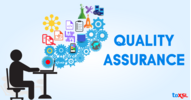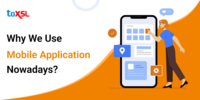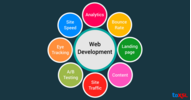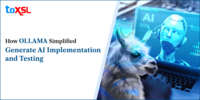- Apr 08, 2025
Share this post on:
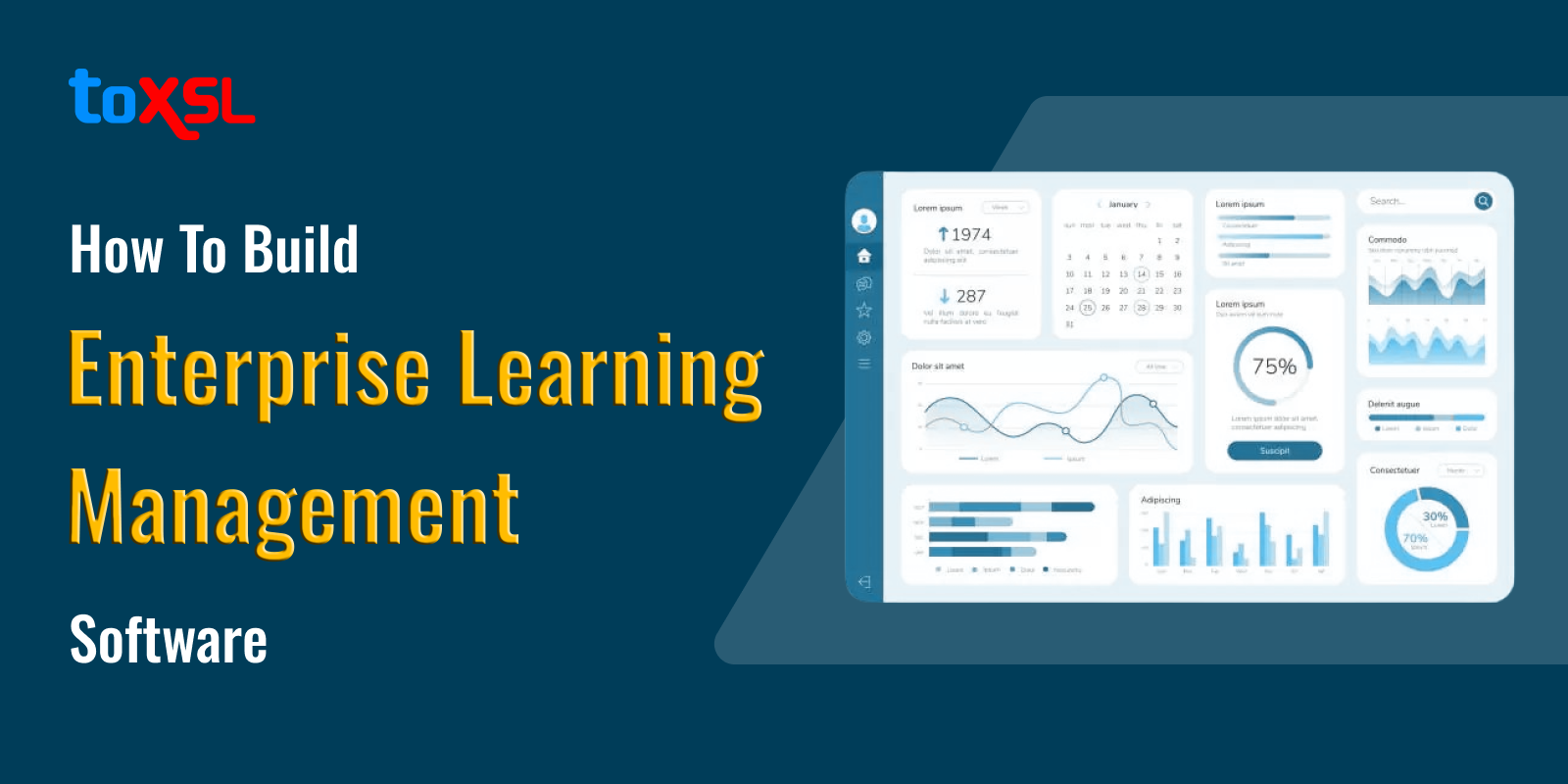
Do you want to streamline your workforce empowerment? According to research, the global enterprise learning management market is estimated to reach USD 63.12 billion by 2033 at a CAGR of 20.24%.
An enterprise learning management software helps organizations streamline their training and learning processes. It is a centralized platform for managing, delivering, and tracking employee progress and measures the effectiveness of training programs. LMS allow organizations develop tailored learning processes based on the roles and goals of the employees.
However, numerous businesses use LMS development to enhance the knowledge of customers. Research says that 47% of businesses replace general-purpose tools such as emails and PowerPoint with LMS software.
LMS is a solution that benefits educational institutions and companies from various sectors, helping them achieve their goals. But how do businesses develop enterprise LMS? In this blog, we will go through a detailed analysis and discuss the development steps, benefits, and types of LMS.
Key Takeaways:
Enterprise Learning Management Software (LMS) helps streamline training and employee progress.
Proper research, business requirements, and the right tech stack are essential for successful LMS development.
Key LMS features include content management, gamification, and integration with HR/ERP systems.
The cost of LMS development ranges between $50,000 and $300,000.
Future trends include AI, AR/VR, and microlearning.
Steps to Develop Enterprise Learning Management Software
Are you looking to develop an enterprise LMS? In this section, we will discuss the various steps involved in the development of enterprise LMS.
Proper Market Research: Do you know what the market requires? Are the features you want to add in your LMS in alignment with the user's needs? Doing proper market research and checking for the needs of users is crucial. This helps businesses develop what is needed, helping them generate better revenue.
Define Business Requirements: Before diving into the development process, clearly define your enterprise learning management software to achieve. Take input from your stakeholders, including administrators, instructors, and users. This will make you understand the needs of your business, helping you enhance your business.
Right Technology Stack: Selecting the right tech stack can be a game changer. Ensure that you select the latest versions of frameworks that are scalable with the changing needs of the market. A few popular frameworks among developers are React, Angular, or Vue.js.
Simplified UI/UX: Develop user-friendly dashboards that are easy to navigate. Your interface must be easy to understand and should be able to communicate with the users.
Develop Enterprise LMS: After your requirements are defined and the tech stack is finalized, it’s time to develop enterprise LMS. Now, develop core modules and track user progress. Ensure to implement communication tools to streamline collaboration.
Integrate Features: Analyzing the feature after development is crucial. Businesses can incorporate artificial intelligence to analyze user-behavior and offer customized content recommendations based on learning preferences.
Deploy and Maintain LMS: Once the development is done, the LMS goes through a testing process. After getting approved from the testing phase, businesses can deploy the software.
Features of Enterprise Learning Management Software
Wondering what features businesses must implement during the development of enterprise learning management software? Let us now discuss the most important feature of enterprise LMS:
Content Management: This feature is one of the basic building blocks of LMS that allow users to develop courses and manage existing ones. An effective LMS development needs tools that allow businesses to work with text, images, audio, and video files.
User Management: An effective LMS allows educators to manage students into groups and give assignments to the entire group or individual student. Also, the features come with sending and receiving private messages and notifications to the students, enhancing communication among students and teachers.
Gamification: Gamification is proven to be a game changer in the realm of LMS. It has simplified the traditional ways of learning, making learning more interesting for the students.
Reporting and Analytics: This feature allows businesses to check the results of training. It allows data that can help educators improve courses, improving overall results in specific topics.
HR and ERP Integration: Integrating HR and ERP features helps businesses enhance their organization’s processes, including employee onboarding, data, and training.
Types of Enterprise Learning Management Software
Now that we have discussed the steps and features of enterprise learning management software, Let us now move forward and learn about the various types of enterprise LMS:
• Open-source LMS: These software are freely available and anyone can use them.
• Commercial LMS: These software are subscription-based and use a wide range of features and services.
• Installed LMS: These are highly secure software and can be easily customized.
• SaaS LMS: These are cloud-based software and are highly flexible.
• Integrated LMS: These can be connected with other ERP and CRM systems.
• Non-integrated LMS: These software operate independently of other ERP systems.
Benefits of Enterprise Learning Management Software
Let us check in detail the benefits of enterprise LMS. Following are the benefits of developing an enterprise LMS:
• Scalability and Flexibility: Using an enterprise LMS, businesses can scale their training efforts. Also, LMS can easily handle the increasing learners and courses, providing flexibility in terms of scalable content delivery.
• Centralized Training: LMS allow organizations centralize their training material in one central location. This removes the need for numerous platforms, ensuring a great learning experience.
• Improved Tracking: An LMS simplifies the management of courses and offers tools that help you create, distribute, and track compliance courses. LMS help businesses generate reports and documentation used during audits.
• Employee Engagement: An enterprise LMS is the best way to attain employees’s attention. These systems allow content integration, gamification, and social media learning features, increasing learner engagement.
What is The Cost of Enterprise Learning Management Software?
Every business wants to evolve and LMS can help businesses with their goal. But the question arises, “How much does it cost to develop enterprise learning management software?" Well, there is no fixed answer. The cost of LMS depends on various factors, such as which technology you want to use, what features and functionalities you want to add, and more.
In general, the cost of enterprise learning management software ranges between $50,000 and $300,000. The cost also includes the cost of maintenance, additional features, AR/VR integration, and more.
The Future Trends in Enterprise LMS Development
Since the technology is rapidly evolving, the importance of LMS is exponentially increasing. The future of enterprise LMS development is at the forefront of technological transformation. Let us dive deeper in the section and learn what’s next in enterprise LMS development:
• Artificial Intelligence: AI helps LMS analysis large amounts of data and understand the needs of learners.
• Virtual and Augmented Reality: AR/VR enhances the courses through simulations of real-world scenarios.
• Microlearning: ML and microlearning through LMS are becoming popular as they manage learners schedules accurately.
Conclusion
Now that we have reached the end of the blog, we discussed the steps, features, types, benefits, cost, and the future of LMS development. We hope that you do not have any doubts left regarding the overall importance of enterprise LMS. If you have any questions regarding LMS, feel free to contact us.
At ToXSL Technologies, we have developed enterprise learning management systems for numerous businesses from various industry verticals. So, if you are looking to hire mobile app developers to develop enterprise learning management software, ToXSL Technologies is here to help. Get in touch with us today and learn how we can help you enhance and streamline your business process with our
learning management development services.
Frequently Asked Questions
1. How long does it take to develop an enterprise LMS?
The time it takes to develop an enterprise Learning Management System (LMS) is not fixed. It depends on numerous factors, including the complexity, size of the project, technology stack used, and more. In general, a basic LMS takes 6–12 months to develop, whereas a large-scale LMS can take up to 1 year or more.
2. Why is ToXSL Technologies the best choice for enterprise LMS development?
We are a leading mobile app development company, helping businesses streamline their processes with our innovative enterprise learning management software. At ToXSL, we have a team of experienced developers who understand the complexities of LMS and offer customized services to meet specific business needs.
3. How do you choose the best enterprise learning management system?
Choosing the right Enterprise Learning Management System (LMS) is critical and you must consider the following factors before finalizing the product:
- Functionality: Ensure that LMS support all the features that your organization requires.
- Customization: LMS must meet your specific business requirements.
- Integration: Ensure that LMS integrates with existing systems and tools.
- Scalability: LMS must offer scalability and help your business grow.
4. How do you hire the best enterprise LMS development company?
Here are the few steps you must consider while hiring the best Enterprise Learning Management System (LMS) development company:
- Look for companies that have positive reviews and a strong track record of successful projects.
- Assess the company's technical skills and experience with similar projects.
- Review their previous work to understand their capability to deliver high-quality solutions.
- Contact previous clients to understand their experiences working with the company.



